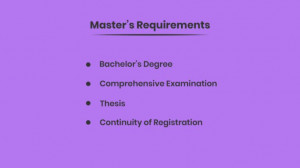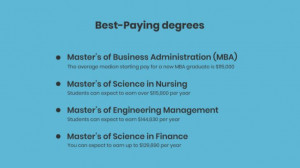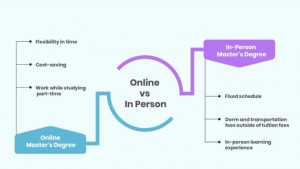Best Online Masters Degree Programs
Get detailed information about best online Masters degree programs in and their tuition, accreditation, career prospects, scholarships, admission details and much more
Online Masters Degree
A master's degree is the next level of education past a bachelor's degree. You usually pursue a master's degree related to the subject you earned your bachelor's in.
A master's degree in your hand proves that you have in-depth knowledge about a specific subject. This can increase the chances of you getting a job in a higher post right from the beginning of your career.
You can study for a master's degree using either the traditional on-campus method or by non-traditional methods such as a distance, part-time, or online education program.
A master's degree can be acquired in almost any subject, such as physics, marketing, finance, engineering, and psychology.
Some master's degrees don't require that you earn a bachelor's degree in the subject first. However, you'll need to have a bachelor's degree before starting the course of study. For example, to earn a Master in Business Administration (MBA), you can have a bachelor's degree in any subject.
Many master's degree programs let you specialize even further in a subject.
For example, a master's degree in physics has general concentrations like Computational Physics, General Physics, and Material Science. It provides research opportunities also in various areas of science.
A master's degree in marketing has specialized concentrations like International Business, Digital Marketing, Marketing Analytics, Marketing Management, etc.
A master's degree in engineering has specialized concentrations in Mechanical, Information Science, Electronics, Civil, etc.
Benefits of earning a master's degree
There are many reasons to consider pursuing a master's degree.
A master's degree program will give you the opportunity to continue your studies or return to school for additional learning. You'll gain even more knowledge about a subject, and you can make use of that knowledge in the future.
A master's degree will also make you more competitive in the job market.
According to the Bureau of Labor Statistics, the number of jobs that require a master's degree increased by 18% between 2012 and 2022. Even if you don't want a job that requires a degree beyond a bachelor's degree, more education won't hurt your chances.
Jobs that require higher levels of education also tend to pay more, so entering an online graduate program and earning a graduate degree can increase your income.
Earning a master's degree will also give you a valuable network.
Many programs, especially MBA programs, focus on helping you meet people and teaching you how to form connections. You can leverage your network down the road to find more job opportunities or to help your business grow.
Master's degree requirements
While the precise requirements to earn a master's degree will depend on the program you choose, there are a few relatively consistent requirements across schools.
The primary requirement is that you must already have an undergraduate degree. You usually can't skip earning a bachelor's degree and go straight for a master's.
However, some schools offer combined programs that let you earn a bachelor's degree and a master's degree at the same time or work toward a master's while finishing your bachelor's degree.
Most schools will also make you take a standardized test like the GRE. You'll have to submit your GRE score with your application.
Once you get into a graduate program, you have to complete a certain number of credit hours to earn your degree.
For example, Northeastern University requires that students complete 30 credit hours of work and a thesis while maintaining a 3.0 GPA to earn a degree.
Harvard Extension School, Harvard University's online master's degree program, requires that students complete twelve classes (48 credit hours), including a thesis, to earn a degree.
Typically, a master's program only requires that you take courses related to your field of study. You usually don't have to take core courses as you did to earn an undergraduate degree.
Best-paying master's degrees
One of the top reasons to enter a master's program is to improve your job prospects and increase your income.
Selecting an online degree program is particularly common for students who want to increase their income as they can keep their current job while pursuing a degree. Once an online student completes their online courses, they can start working toward a promotion or look for a new job.
Prospective students that want to increase their income through online learning might want to consider these degree programs:
Master of Business Administration (MBA)
A Master of Business Administration (MBA) program is one of the most popular and best-paying master's programs. An MBA program readies you for a management role in many different businesses.
Depending on your interests and previous education, you can use an MBA to find a role managing different aspects of a company, such as a computer science, IT, marketing, or sales team.
It may seem like you will miss out on networking and other things if you choose an online MBA program, but many schools find ways to offer a similar experience both online and in person.
The average median starting pay for a new MBA graduate is $115,000.
Master of Science in Nursing
If you're working in healthcare but don't want the time and expense of becoming a doctor, earning a Master of Science in Nursing is another way to advance your career.
Students often work toward becoming nurse anesthetists, who can assist with anesthesiology, or nurse practitioners, who can take on some of the duties typically reserved for doctors.
Students can expect to earn over $115,800 per year, depending on the specialization they choose.
Master of Engineering Management
A Master of Engineering Management prepares you for more advanced and difficult engineering projects.
For example, students may graduate into a role as an architectural and engineering manager, running a team that's responsible for designing and erecting buildings.
Students can expect to earn $144,830 per year after graduating with this degree.
Master of Science in Finance
If you're working in the world of finance, higher education can help you land higher-paying roles and give you more credibility.
Depending on your interests, this degree can prepare you to work as a manager at an investment firm or to work directly with clients as a financial advisor. You may choose to earn additional certifications to help you draw more clients.
You can also find an accounting program that will prepare you for higher-level roles as an accountant.
Depending on the role you choose, you can expect to earn up to $129,890 per year after earning this degree.
Online vs. in-person master's degrees
An online program has many advantages over in-person master's degree programs, but you might worry about missing out on some essential aspects of in-person learning.
While it's true that it can be hard to replicate the classroom experience online, the flexibility and cost-savings offered by an online master's program are significant.
Harvard, one of the top universities in the world, is a great example of this.
The tuition for a single year of study at the Harvard Graduate School of Education is $51,904. This is before other costs such as room and board and transportation.
At the Harvard Extension School, online learners must complete twelve courses to earn their degree. Each course costs $2,900 for a total cost of $34,800. The entire degree from Harvard's online program costs less than a single year of study for the in-person program.
Students in an online program also can avoid costs such as room and board in a dormitory.
Often, they can keep their jobs and study part-time, which means they won't lose income, making the effective cost of an online degree program even lower.
Online programs have other advantages to consider.
Often, an online graduate student will have the flexibility to watch lectures when they have the time, rather than having to stick to a set schedule.
Because many people pursue a master's degree after they've already started a career, this additional flexibility can be a major benefit of online programs.
Conclusion
A master's degree is a great way to make yourself more marketable to employers and increase your income.
If you're thinking about working toward a master's degree, consider an online degree program. They're often cheaper and more flexible than in-person classes while providing the same benefits.
If you're considering an online degree program and want to know how to pay for it, check out The College Monk's list of the best student loans.
Masters Degrees in Anthropology
Master of Arts
Idaho State University
Pocatello, Idaho
Anthropology Accreditation: Request Info
Avg Credits: 30
Avg Tuition: $ 14,100
Avg Federal grant awarded: $4,463
Avg Institutional grant awarded: $4,329
Graduation Rate: 29%
Also See: Programs & Tuitions
Total Programs in Anthropology (1)
Request InfoHumboldt State University
Arcata, California
Anthropology Accreditation: Request Info
Avg Credits: 33
Avg Tuition: Request Info
Avg Federal grant awarded: $4,971
Avg Institutional grant awarded: $5,285
Graduation Rate: 46%
Also See: Programs & Tuitions
Total Programs in Anthropology (1)
Request InfoUniversity of North Texas (UNT)
Denton, Texas
Anthropology Accreditation: Request Info
Avg Credits: 24
Avg Tuition: $ 44,796
Avg Federal grant awarded: $4,534
Avg Institutional grant awarded: $4,513
Graduation Rate: 52%
Also See: Programs & Tuitions
Total Programs in Anthropology (1)
Request InfoMaster of Public Administration
Harvard University
Cambridge, Massachusetts
Anthropology Accreditation: Request Info
Profit Type: Private Not-For-Profit
Avg Tuition: $ 35,000
Avg Federal grant awarded: $7,651
Avg Institutional grant awarded: $46,044
Graduation Rate: 97%
Also See: Programs & Tuitions
Total Programs in Anthropology (1)
Request InfoMaster of Science
University of North Texas (UNT)
Denton, Texas
Anthropology Accreditation: Request Info
Avg Credits: 24
Avg Tuition: $ 44,796
Avg Federal grant awarded: $4,534
Avg Institutional grant awarded: $4,513
Graduation Rate: 52%
Also See: Programs & Tuitions
Total Programs in Anthropology (1)
Request InfoAdams State University
Alamosa, Colorado
Anthropology Accreditation: Request Info
Avg Credits: 30
Avg Tuition: $ 9,810
Avg Federal grant awarded: $4,823
Avg Institutional grant awarded: $4,440
Graduation Rate: 25%
Also See: Programs & Tuitions
Total Programs in Anthropology (1)
Request InfoMasters Degrees in Physics
Master of Science
American Public University System
Charles Town, West Virginia
Physics Accreditation: Request Info
Avg Credits: 36
Avg Tuition: $ 12,600
Avg Federal grant awarded: $4,546
Avg Institutional grant awarded: $825
Graduation Rate: 36%
Specializations Offered: Astronomy
Total Programs in Physics (1)
Request InfoEmporia State University
Emporia, Kansas
Physics Accreditation: Request Info
Avg Credits: 45
Avg Tuition: $ 21,150
Avg Federal grant awarded: $4,469
Avg Institutional grant awarded: $2,646
Graduation Rate: 44%
Also See: Programs & Tuitions
Total Programs in Physics (1)
Request InfoMichigan State University (MSU)
East Lansing, Michigan
Physics Accreditation: Request Info
Avg Credits: 54
Avg Tuition: $ 44,820
Avg Federal grant awarded: $4,907
Avg Institutional grant awarded: $9,892
Graduation Rate: 78%
Also See: Programs & Tuitions
Total Programs in Physics (1)
Request InfoFlorida Institute of Technology
Melbourne, Florida
Physics Accreditation: Request Info
Avg Credits: 36
Avg Tuition: $ 27,972
Avg Federal grant awarded: $5,596
Avg Institutional grant awarded: $21,474
Graduation Rate: 58%
Specializations Offered: Astronomy
Total Programs in Physics (1)
Request InfoMaster of Arts
Washington University in St. Louis
St. Louis, Missouri
Physics Accreditation: Request Info
Avg Credits: 36
Avg Tuition: $ 30,600
Avg Federal grant awarded: $6,920
Avg Institutional grant awarded: $38,434
Graduation Rate: 94%
Also See: Programs & Tuitions
Total Programs in Physics (1)
Request InfoMasters Degrees in Military
Master of Arts
Liberty University
Lynchburg, Virginia
Military Accreditation: Request Info
Avg Credits: 33
Avg Tuition: $ 18,645
Avg Federal grant awarded: $4,674
Avg Institutional grant awarded: $9,109
Graduation Rate: 51%
Specializations Offered: Counseling
Total Programs in Military (2)
Request InfoNorwich University
Northfield, Vermont
Military Accreditation: Request Info
Avg Credits: 36
Avg Tuition: $ 24,822
Avg Federal grant awarded: $6,191
Avg Institutional grant awarded: $22,268
Graduation Rate: 58%
Also See: Programs & Tuitions
Total Programs in Military (2)
Request InfoMilitary Accreditation: Request Info
Profit Type: Public
Avg Tuition: Request Info
Avg Federal grant awarded: $4,406
Avg Institutional grant awarded: $13,886
Graduation Rate: 69%
Also See: Programs & Tuitions
Total Programs in Military (2)
Request InfoMaster of Science
Embry-Riddle Aeronautical University (ERAU)
Daytona Beach, Florida
Military Accreditation: Request Info
Avg Credits: 33
Avg Tuition: $ 17,820
Avg Federal grant awarded: $4,984
Avg Institutional grant awarded: $13,871
Graduation Rate: 55%
Also See: Programs & Tuitions
Total Programs in Military (2)
Request InfoWilmington University
New Castle, Delaware
Military Accreditation: Request Info
Avg Credits: 33
Avg Tuition: $ 15,378
Avg Federal grant awarded: $2,436
Avg Institutional grant awarded: $762
Graduation Rate: 33%
Also See: Programs & Tuitions
Total Programs in Military (1)
Request InfoMaster of Divinity
Military Accreditation: Request Info
Profit Type: Private Not-For-Profit
Avg Tuition: Request Info
Avg Federal grant awarded: $4,839
Avg Institutional grant awarded: $599
Graduation Rate: 45%
Also See: Programs & Tuitions
Total Programs in Military (2)
Request InfoMasters Degrees in Human Services Administration
Human Services Administration Accreditation: Request Info
Avg Credits: 30
Avg Tuition: $ 9,820
Avg Federal grant awarded: $4,646
Avg Institutional grant awarded: $2,797
Graduation Rate: 69%
Also See: Programs & Tuitions
Total Programs in Human Services Administration (1)
Request InfoHuman Services Administration Accreditation: Request Info
Avg Credits: 40
Avg Tuition: $ 43,826
Avg Federal grant awarded: $4,752
Avg Institutional grant awarded: $3,406
Graduation Rate: 59%
Specializations Offered: Healthcare Management and Administration , Public Health
Total Programs in Human Services Administration (3)
Request InfoAntioch University-Seattle
Seattle, Washington
Human Services Administration Accreditation: Request Info
Avg Credits: 36
Avg Tuition: $ 35,172
Graduation Rate: 13%
Also See: Programs & Tuitions
Total Programs in Human Services Administration (1)
Request InfoAntioch University-Los Angeles
Culver City, California
Human Services Administration Accreditation: Request Info
Avg Credits: 36
Avg Tuition: $ 25,200
Also See: Programs & Tuitions
Total Programs in Human Services Administration (1)
Request InfoMaster of Science
Wilmington College
Wilmington, Ohio
Human Services Administration Accreditation: Request Info
Avg Credits: 30
Avg Tuition: $ 15,741
Avg Federal grant awarded: $5,062
Avg Institutional grant awarded: $10,244
Graduation Rate: 56%
Also See: Programs & Tuitions
Total Programs in Human Services Administration (1)
Request InfoMasters Degrees in Science
Master of Science
Science Accreditation: Request Info
Profit Type: Private Not-For-Profit
Avg Tuition: Request Info
Avg Federal grant awarded: $5,425
Avg Institutional grant awarded: $17,633
Graduation Rate: 46%
Also See: Programs & Tuitions
Total Programs in Science (1)
Request InfoScience Accreditation: Request Info
Profit Type: Public
Avg Tuition: Request Info
Avg Federal grant awarded: $4,455
Avg Institutional grant awarded: $3,465
Graduation Rate: 33%
Also See: Programs & Tuitions
Total Programs in Science (1)
Request Info














